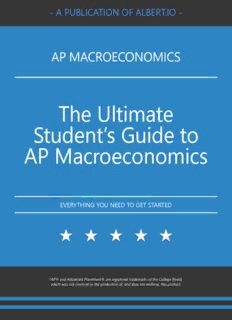
Ultimate Guide to AP Macroeconomics PDF
Preview Ultimate Guide to AP Macroeconomics
- A PUBLICATION OF ALBERT.IO - AP MACROECONOMICS The Ultimate Student’s Guide to AP Macroeconomics EVERYTHING YOU NEED TO GET STARTED *AP® and Advanced Placement® are registered trademarks of the College Board, which was not involved in the production of, and does not endorse, this product. Ready to Score Higher? Stop stressing about the AP Macroeconomics Exam. Albert has got your back! With thousands of practice questions, personalized statistics, and anytime, anywhere access, Albert helps you learn faster and master the difficult concepts you are bound to see on test day. Click below or visit https://www.albert.io Start Practicing TABLE OF CONTENTS 8 Introduction 9 About Us 12 Is AP Macroeconomics Hard? 21 Production Possibilities Curve (PPC) 29 Absolute vs. Comparative Advantage 36 Aggregate Demand TABLE OF CONTENTS 45 What Shifts Aggregate Demand and Supply? 61 The Business Cycle 69 How to Calculate Gross Domestic Product for AP Macroeconomics 77 Inflation 83 Unemployment 89 How to Graph Short-Run Phillips Curves TABLE OF CONTENTS 96 The Multiplier Effect 101 The Spending Multiplier 107 The Money Multiplier 112 Crowding Out Effect 117 Financial Assets 124 Monetary Policy 131 Fiscal Policy TABLE OF CONTENTS 138 Taxes 147 10 Must-Know Basic Economic Concepts for AP Economics 156 6 Ways to Score Big on the AP Macroeconomics Multiple Choice 161 7 Actionable Strategies for Tackling AP Macroeconomics Free Response TABLE OF CONTENTS 167 How to Study for AP Macroeconomics 180 One Month AP Macroeconomics Study Guide 212 The Ultimate List of AP Macroeconomics Tips Introduction AP Macroeconomics is no walk in the park. Last year, only 16.1% of students earned a 5 on the exam. That’s why we’ve created this comprehensive study tool. It’s intended to be a helpful resource for any student planning to take the AP Macroeconomics exam. By beginning here, you’ll have a better understanding of the test, and receive essential tools to set yourself up for success. This guide starts by introducing the exam format, curriculum, and scoring guidelines. Then it includes a series of detailed content guides and crash course reviews. The last section features study tips and strategies to help you score every possible point on test day. With this eBook, you’ll be able to confidently take action in creating your study plan and framing your goals. This book features information from the Albert Blog, where new academic resources are published every day of the week. Be sure to regularly check the blog and subscribe to hear about our new posts. You can also find tips and study guides for your AP classes, and admissions advice for your dream school on our blog. E-mail us at [email protected] if you have any questions, suggestions, or comments! Last Updated: February 2017. Interested in an Albert license? E-mail us at [email protected] 8 About Us What is Albert? Albert bridges the gap between learning and mastery with interactive content written by world-class educators. We offer: • Tens of thousands of AP-style practice questions in all the major APs • A complete competitive online leaderboard to see where you stand compared to others • Immediate feedback on each question answered • An easy to access platform from any Internet-enabled device • In-depth personal statistics to track your progress • Intuitive classroom tools for teachers and administrators Discover why thousands of students and educators trust Albert Interested in an Albert license? E-mail us at [email protected] 9 Why Educators Love Us We asked teachers how their students did after using Albert. Here is what they had to say: My students had an 81.2% passing rate -the previous year was 76% (the highest rate in our county)! I am thrilled. I had 64 students total, with 6 receiving 5s, 19 scoring 4s, 27 receiving 3s, 10 scored 2s and 2 received 1s. Susan M., JP Taravella High 70% of my students scored 3 or higher. This is up from last year, and is also well above the national average. Needless to say, I am very happy with my students' success. I used Albert more intentionally this year. In the beginning of the year, I wanted students simply to answer questions and practice. Once they had 150-200 questions answered, we looked for trends, strengths, and weaknesses and worked on addressing them. Students were tasked with increasing their answer accuracy no matter how many questions it took, then they set their own goals (some wanted to focus around tone; others needed practice with meaning as a whole). Bill S., Lapeer High School Last year 40% passed with 3s and 4s. This year 87% passed, most had 4s and 5s. We used the stimulus-based multiple choice questions throughout the year and as review for the exam. I think it helped tremendously. Alice P., First Baptist Christian Academy Interested in an Albert license? E-mail us at [email protected] 10
Description: